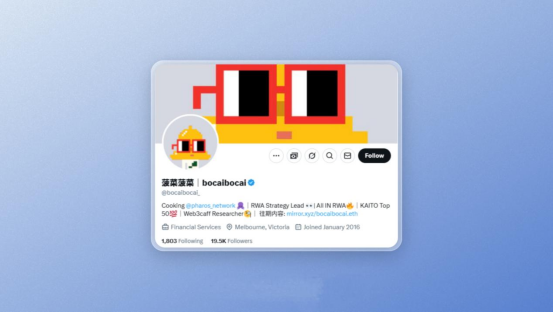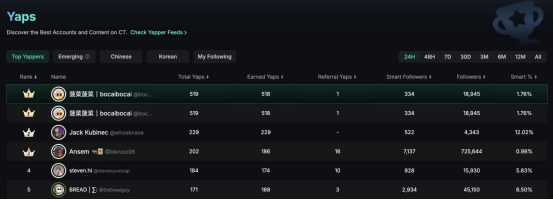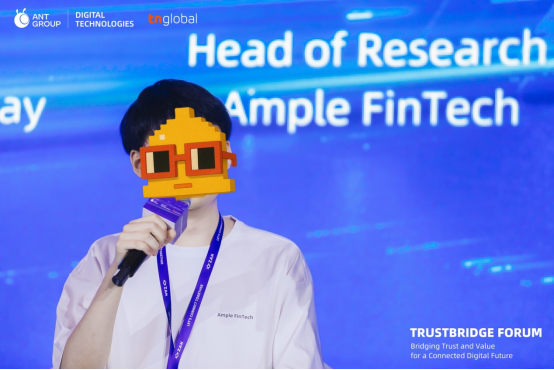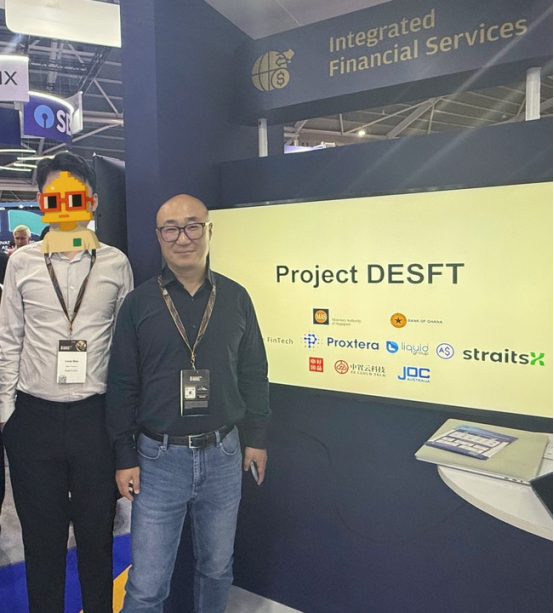

1. Could you please introduce yourself?
Hello everyone, I am Bocai, and I am currently the RWA Asia Pacific Strategy Director of Pharos, responsible for Pharos' RWA strategic planning and cooperation. At the same time, I am also a Web3 content creator, and I have accumulated nearly 20,000 fans on X. Although the number is not large compared to other top bloggers, the overall quality of the fans makes me quite satisfied.
Unlike many Web3 practitioners, I have a unique working experience: I have previously been deeply involved in two Tokenization pilot projects in cooperation with the central banks of three countries (Singapore, Australia, and Ghana), during which I dealt with many government agencies, traditional finance, and international organizations. This experience has given me a more comprehensive and in-depth understanding of the intersection of traditional finance and Web3, which is what everyone calls the RWA field.
Recently, my essay about joining Pharos successfully topped the Yap global rankings, sparking widespread discussion and attention on X, and even attracted many English bloggers to come and watch. The popularity was far beyond my imagination.

2. Can you tell us about your past experiences?
I officially entered the Web3 field in 2021. At that time, I was still an undergraduate student majoring in finance. I first came into contact with blockchain through a friend's introduction. But to be honest, I didn't understand the underlying logic of blockchain and BTC at all at that time. I just thought it was very interesting. Like most newcomers, I also went through the "tuition" stage of currency speculation and contract trading, and stepped on many pitfalls.
The real turning point was my internship experience at a traditional financial brokerage company in Shanghai during my undergraduate studies. This was my first job in the financial industry. During the internship, I realized that the traditional financial industry was already very saturated and relied more on resources rather than cognition. There was limited room for growth and opportunities for young people. Although there was an opportunity to enter a larger financial institution at the time, after careful consideration, I chose to devote myself to the Web3 field, which is full of unlimited innovation possibilities - this was the first important decision in my career.
In order to systematically learn about this emerging field, I joined a Web3 research institute in Shanghai as a researcher. At that time, the concept of DAO organizations was booming in China. I participated in some popular DAO organizations and even founded a well-known DAO as a founding member. During this period, I not only met many industry partners, but more importantly, accumulated a solid theoretical foundation.
During my time in DAO, due to the nature of my work, I often produced some "10,000-word research reports" in DAO. At that time, the industry was thriving, and "10,000-word research reports" were particularly popular. I was also nicknamed "research report sow" by everyone. It was during that time that I produced a lot of reports and continued to follow the development of the industry, actively communicating and discussing with everyone in various groups, which laid a foundation for my basic knowledge framework system for the entire Web3 industry.
The second important turning point in my career came from a seemingly "crisis". At that time, the DAO organization in which I was deeply involved had an internal disagreement, and Professor Chen Jian and I eventually chose to withdraw from the organization together. However, it was this "setback" that changed the trajectory of my life.
At that critical moment, Teacher Chen Jian became my true mentor and benefactor. He said something to me that changed the trajectory of my life: "Since you are so good at writing articles and outputting content, why don't you create your own Twitter account?" This sentence instantly enlightened me and made me start trying to operate an account of my own.
The timing was also very coincidental - Ethereum was preparing for the Cancun upgrade, which was a major technological innovation in the industry, but there was a lack of easy-to-understand analytical articles on the market. I keenly captured this opportunity and decided to make an in-depth research report on the Cancun upgrade as the first appearance of my Twitter account.
The result was far beyond my expectations. With the recommendation of Mr. Chen Jian, this article quickly attracted the attention and reposting of many industry KOLs, forming a viral effect. In the end, this debut article received more than 200,000 readings, which helped me accumulate the initial 3,000 fans and complete my "account establishment".

This success opened a virtuous cycle of continued influence expansion for me. With a keen sense of industry hot spots, I have successively grasped a number of hot topics in the industry and produced a series of in-depth content with a reading volume of 100,000. For example, after the Silicon Valley Bank explosion, I quickly wrote an in-depth and easy-to-understand analysis article, explaining the causes and consequences of this explosion from the perspective of interest rate transmission; and for the increasingly rampant phishing methods such as Permit2, I explained its underlying technical logic in plain language, helping many users understand and prevent phishing security risks.
At the same time, I also deeply felt that the Web3 industry in China has great limitations. I realized that if I really want to have good development in the industry, I must look for development opportunities overseas. This also prompted me to make the third important decision in my career - to go to Australia for graduate studies.
I chose to study for a master’s degree in blockchain at the Royal Melbourne Institute of Technology (RMIT), which was the only blockchain degree program offered in Australia at the time. Choosing blockchain also showed my determination to go all in on Web3.
During my study in Australia, I had the opportunity to meet many industry partners, and the one who had the greatest influence on me was undoubtedly my second mentor, Mr. Meng Yan. I was deeply shocked by the in-depth communication with Mr. Meng, and I was impressed by his deep insight into the underlying value logic of Web3. Unlike many practitioners in the market who only focus on narrative hype, Mr. Meng has always focused on exploring the true value and social significance of blockchain technology. This level of cognition and values deeply attracted me.
Coincidentally, Professor Meng Yan was participating in the CBDC pilot project of the Reserve Bank of Australia at that time. This project aroused my great interest. So after my active efforts, I successfully joined Professor Meng's team and was deeply involved in this meaningful project.
Subsequently, our cooperation was further expanded to jointly carry out an innovative project called Project DESFT with the Monetary Authority of Singapore (MAS) and the Central Bank of Ghana in Africa. This project deeply explored the application potential of tokenization technology in key areas such as international trade, trusted credentials and programmable payments.
These project experiences have brought me immeasurable value: not only have I gained precious opportunities to work directly with traditional financial institutions, governments, central banks and international organizations, but I have also formed a unique industry perspective - the ability to think about problems at the intersection of traditional finance and Web3. It is these profound accumulations and unique cross-border experiences that ultimately became the key factors for my successful joining Pharos and established a unique reputation for me in the industry.
Core content: I entered Web3 in 2021. I was initially interested in cryptocurrencies and started to speculate in them. Later, I found that the opportunities in the traditional financial industry were saturated, so I joined the Web3 research institute and participated in the output of content for multiple DAO projects. At the suggestion of Professor Chen Jian, I began to publish content output on Twitter, which successfully aroused popularity and accumulated fans. I then went to Australia for postgraduate studies, during which I met Professor Meng Yan and participated in pilot projects of multiple central banks. These experiences laid a solid foundation for me to join Pharos later.
3. Can you tell us about what you are doing?
At present, my work is mainly divided into two aspects. One is my core work, as the head of Pharos' RWA Asia-Pacific strategy, I formulate strategic plans around RWA for the project based on global development trends, and at the same time promote cooperation with RWA-related participants to build a public chain ecosystem.
Another aspect is that as a content blogger for X, I continue to pay attention to industry trends, share my knowledge and insights, and output industry-related content. Although these two roles seem different, they are actually complementary. The various new perspectives and industry trends I come across at work can help me understand the market more deeply, so as to produce more high-quality content. And these contents in turn can enhance my understanding of the entire ecosystem. The two form a positive cycle and promote each other.
Core content: My work mainly consists of two aspects. One is to formulate strategies and promote public chain ecological cooperation as the head of RWA Asia Pacific strategy of Pharos; the other is to share industry dynamics and insights as a content blogger of X. The two complement each other. New perspectives and trends in my work help me to deeply understand the market and produce high-quality content, which in turn enhances my understanding of the ecology and forms a positive cycle.
4.What are your most memorable experiences in web3?
The first one is about the experience of missing out on financial freedom. When Trump released the meme, I saw the news almost as soon as he tweeted it. At that time, I was shocked and skeptical - the president of the United States personally releasing a meme really exceeded everyone's expectations.
Although my intuition told me that this might be a great opportunity, I had an appointment at the time and was in a hurry to go out. In addition, my funds were all on the SUI chain at the time, and there was a lack of convenient cross-chain operation channels, so I eventually missed this opportunity. Watching the price soar from 0.8U when I was paying attention to it to a maximum of 70U, this should be the biggest wealth opportunity I missed.
The second experience was during the 2023 Singapore Fintech Festival, when Project DESFT, a project we collaborated on with the Monetary Authority of Singapore, was officially unveiled at the venue. It was also because of the exposure of this project that I was fortunate to be invited by Ant Group to be a panel speaker. This was the first time in my life that I gave a full English speech. At that time, I was still a college student, and I spent a week preparing for it. It was also a very unforgettable experience.

The third unforgettable experience is that the short essay I wrote after joining Pharos recently was ranked first in the Chinese and global rankings on Yap, which was completely beyond my expectation. I even posted a circle of friends as a commemoration. Because I didn't expect that this matter would receive so much attention, many KOLs in the Chinese circle sent their blessings, which made me realize that my accumulation in the industry is meaningful and has a very positive impact.
Core content: The three most unforgettable experiences in Web3 are: first, I missed the huge wealth opportunity when Trump’s coin increased from 0.8U to 70U due to going out and fund allocation issues; second, as a college student, I was invited by Ant Group to be a speaker during the Singapore Fintech Festival; third, after joining Pharos, the shared articles topped the Yap global list and received extensive discussion.
5. Can you share with us the skills or areas that you think you are good at?
First of all, I think it is research ability. I prefer to do some analysis of the underlying logic and explain the underlying logic behind something in simple and easy-to-understand language. For example, I wrote an article about web3 phishing attacks, analyzing why our money is gone after clicking a link and operating it. What happened behind it?
In addition to research, I think the next thing is the ability to build social influence and integrate resources. I always believe that in this industry, working alone is far less effective than working together for a win-win situation. I am good at establishing extensive industry connections through sincere communication and sharing valuable content, and I am good at using these relationship networks to generate positive social leverage effects. This ability not only helps me build a good reputation in the industry, but also allows me to integrate resources and promote project development at critical moments.
Core content: I am good at low-level logic analysis and like to explain complex concepts in simple and easy-to-understand language, such as analyzing the logic behind Web3 phishing websites. In addition to research, I am also good at using social leverage to build influence and good relationships through communication and sharing of ideas.
6. Do you have any friends that you admire? Can you share what qualities and abilities of them you admire?
Speaking of my most admired friend, I must mention Teacher Chen Jian.
First of all, Mr. Chen Jian has an admirable depth and foresight in industry cognition . His X account has become an important window for many practitioners to understand the latest developments in the industry. He can occupy a leading position in the fiercely competitive X content creation field with his professional ability and continuous output, which in itself proves his strength and value.
What I admire even more is his supportive attitude towards newcomers. In this industry, many people tend to become arrogant or reject newcomers after they become successful, but Mr. Chen Jian is completely different. He always maintains an open and inclusive attitude, is willing to actively discover and support newcomers with potential, and has also helped many people find jobs in the industry. This quality is indeed very rare and precious in the industry.
Teacher Chen Jian often conveyed a profound industry concept to me: in the relatively small circle of Web3, we must always adhere to the principle of making friends. He often said, "You never know who you will intersect with in the future. Today's stranger may be tomorrow's partner. In this circle, everyone may be your friend and teacher. Make fewer enemies and build more connections." This concept has deeply influenced me and has become an important principle for me to walk in the industry.
Core content: Mr. Chen Jian is my most trusted friend. He has a very deep understanding of the industry and is willing to help newcomers, which is very rare in the industry. He often shares a concept: in the Web3 industry, you should make friends widely, because this circle is small and you don’t know who you will intersect with in the future. He always considers issues from the perspective of others and has accumulated a great influence in the industry. These qualities have inspired me deeply.
7. What key nodes in your web3 career have had a particularly big impact on you? What did you do right or wrong?
Looking back on my career development, I think the best decision I made was to fully invest in the Web3 industry at the right time. This seemingly risky choice eventually became the most important turning point in my career.
Specifically, there are several key strategic decisions in my life that have played a crucial role. The first is to resolutely choose this emerging field between traditional finance and Web3. Although there were many uncertainties at the time, I firmly believed in the huge potential of this industry.
Secondly, inspired by Professor Chen Jian, I started using Twitter and persisted in long-term content output to accumulate professional influence, which laid a solid foundation for my subsequent development.
Another equally important decision was to choose to study abroad to seek opportunities. If I had not decided to go to Australia to continue my studies, I would not have had the opportunity to meet Professor Meng Yan, nor would I have had the precious experience of participating in the central bank project later.

I deeply realize that these achievements of mine are not achieved simply by personal efforts, but more because I was lucky enough to seize the era opportunity of the explosive development of the Web3 industry. Making the right choice at the right time often determines the final results more than the subsequent efforts. This industry has provided a huge dividend window for early participants in the past few years, and I am fortunate to be a beneficiary of this era. This makes me understand the power of choice more deeply and look at my achievements more humbly.
Core content: The most correct decision was to devote all my energy to the Web3 industry. I have made several key strategic choices in my life: choosing to enter Web3 instead of traditional finance, starting Twitter and insisting on content output, choosing to study abroad and meeting and joining Professor Meng Yan's team. But these achievements are more due to the dividends given by the times and the industry, reflecting the truth that "choice is greater than effort". I was fortunate to make the right choice at the right time, catch the early express train of the development of the Web3 industry, and become a beneficiary of the opportunities of this era.
8. Do you have any questions you would like to share?
Recently, there has been a heated discussion in the industry about "youth" and "upward socialization". As a deep participant in this industry, I would like to share some of my observations and thoughts.
First of all, I firmly believe that Web3 is essentially an industry for young people, and the dividends here are still huge. If we look at the future three to five years later, that is the critical period for the industry to really explode, and our generation happens to be in the golden age of around 30 years old, with enough experience accumulation and creativity to contribute more value to the development of the industry. This is a historic opportunity for our generation.
But for young people who want to enter this industry, I think they must first clarify a fundamental question: Are you here with a short-term arbitrage mentality to "make a quick buck and leave", or are you really optimistic about this industry and willing to work hard for a long time? This difference in mentality will directly determine how far you can go in this industry.
Looking back at the past few bull and bear cycles, I have observed an obvious pattern: those young people who have truly established themselves in the Web3 field have basically never left the industry and have always been quietly working hard. Those who rushed in just because the market was good often chose to leave after a wave of market conditions ended. The group of talents who really stayed are the core force with influence and status in the industry today.
Another thing that worries me is that I find that many new young people now have a clear cognitive gap with our generation. When I first entered the industry, everyone was keen to discuss deep topics such as DeFi innovation, Ethereum protocol, consensus mechanism, DAO, etc. These visions made us excited and mission-driven at the time.
Now, many newcomers seem to have only one goal - to make quick money through short-term speculation in Meme and become a p-player, lacking a deep understanding of the real innovative value of this industry. I even suspect that many people have not even read the white papers of BTC and Ethereum carefully.
Therefore, I would like to give a few suggestions to new entrants: If you really want to develop in this industry for a long time, the most important thing is to have a deep understanding of the underlying logic and core mechanisms of the industry. Only by understanding the essence of blockchain technology, the innovative significance of various protocols, and the disruptive changes that this industry has brought to the traditional world, can you truly create unique value for the industry.
Specifically, newcomers should focus on filling two key gaps: information gap and cognitive gap. Take the initiative to learn the basics of the industry, deeply understand the technical principles, and form your own unique industry insights. Only in this way can you find your own position in the highly competitive Web3 world, and leverage your personal development by providing real value, and gain long-term sustainable growth opportunities.
Core content: I believe that the dividends of the Web3 industry still exist, and it is essentially an industry for young people. For newcomers who want to enter this industry, the most important thing is to think about whether they want to make short-term speculation or are willing to dig deep in the long term. It is recommended that newcomers understand the underlying logic of the industry instead of focusing only on short-term interests. Only by deeply understanding the essence of the industry can you create long-term value and find your own unique position.
【Web3 Profile】Web3's first personal interview platform, deeply explores the stories behind 100 KOLs, fund founders, entrepreneurs, and builders in the industry, focusing on their experience in the cryptocurrency circle and their growth experience, and focusing on exploring their personal experience. It is committed to making the personal experience of the interviewees shine and showing the most authentic growth stories of the people.
Disclaimer: [Web3 Profile] disseminates content with a neutral attitude. This article does not constitute any investment advice and is for reference only.

